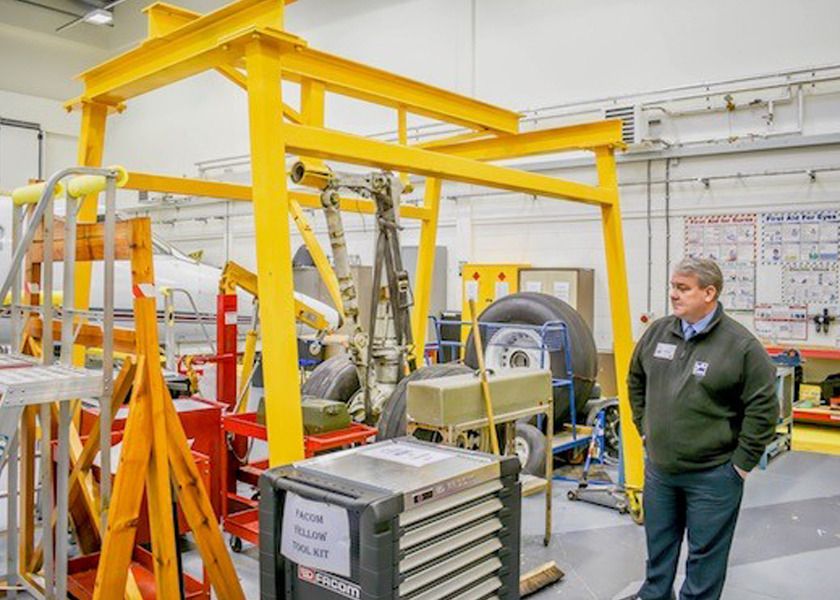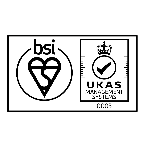
Delivering the Lifting Equipment Technician apprenticeship
Ross Moloney and Andrew Wright, CEO and Deputy CEO of the Lifting Equipment Engineers Association (LEEA), visited City of Bristol College’s Advanced Engineering Centre to view its facilities and discuss delivery of the Lifting Equipment Technician apprenticeship.
The Level 3 Lifting Equipment Technician apprenticeship standard is now officially live. City of Bristol College is working with LEEA to develop an approach to delivery that has flexibility to the fore. Speaking during a tour of the Advanced Engineering Centre of City of Bristol College, Ross Moloney said: “This is going to be an awesome opportunity, with Innovative ways to make sure that the apprenticeship delivery is engaging and offers value to reassure employers. LEEA is really happy to support providers as they look to improve and deliver truly demand led training.”
Located at Parkway in Bristol, the Advanced Engineering Centre delivers specialist engineering, aeronautical, manufacturing and automotive courses, reflecting the City of Bristol’s strong aviation history. The superb facilities provide large engineering workshops, electronics equipment, a hydraulic lab, pneumatics test equipment, a CNC workshop and lathes. Other facilities include solid modelling equipment and computer-aided learning equipment.
The centre, which has a great geographical location close to Bristol Parkway station and the M4, is also home to the DAF Apprentice College, where the commercial vehicle manufacturer provides the latest technology, specialist tools and equipment as well as trucks for apprentices to train on.
With this being a new standard, City of Bristol College has been the first training institution to engage with the Lifting Equipment Technician apprenticeship, which is available across the whole of England.
Simon Arnold of City of Bristol College said: “We have a strong tradition of working in engineering and so this is a natural progression for us. By working with LEEA we can add lifting engineering to our portfolio. Closely working with the trade association means that we’ll have a great solution for employers looking to engage with apprenticeships.”
He added: “We see the apprenticeship as a fantastic opportunity to attract new entrants into the sector, acting as a pathway towards a professional, long-term career. However, it is also important to remember that apprenticeships apply to all ages. Employers who may have taken somebody on and feel ready to invest in them, or want to avoid a member of staff doing a job they are not actually trained for, can see apprenticeships as a means of up-skilling.“
In addition to offering training with minimum hassle, the costs involved with apprenticeships are also low. If you are a levy paying employer (with a wage bill over £3m) there is no cost. For an employer with less than 50 employees, where the apprentice is under 19, it is free. If you are a levy payer and the apprentice is over 19, the cost is 5% – circa £600. You can partner with a levy paying employer who can fund your apprenticeship at no cost to yourself. The Government incentive to help employ an apprentice until 31 January 2022 is worth noting. This gives £3000 with an additional £1000 for those under 19. Given that retention of staff with apprenticeships is high, these figures underscore the value they bring to a business.
To ensure the apprenticeship is delivered with as much flexibility as possible, which will help encourage engagement from companies and students, LEEA is currently evaluating a ‘boot camp’ approach that will get students into a college for a set period of time against day release for the 24-month duration apprenticeship. The split between college and online delivery will be additional boost to flexibility. Using cameras to provide multiple views to give a full learning experience online can minimise the carbon footprint as well as save time and cost compared to traveling long distances. This ‘green training’ is becoming increasingly popular, particularly in the post-Covid era.
An apprenticeship requires 20% of the training to be ‘off-the-job’. Costs associated with this can be minimised with the boot camp approach. Also, ‘Zooming’ into a training room counts as off-the-job training, as does working in different departments within a company. So if, for example, somebody who works in sales spends time in the engineering department, then that time will count as off-the-job training. As Simon Arnold points out: “For those concerned about retaining trained staff I would say don’t worry about training your staff and them leaving, worry more about having untrained staff staying.”
LEEA is also working with an End Point Assessment (EPA) organisation to ensure that apprentices get the best possible support throughout their course. Better engagement between employers and assessors is vital for achieving successful results. Too often people only think of EPAs towards the end of an apprenticeship. However, employers and training advisors are advised to engage much earlier to gain a good understanding of what the EPA is all about and to avoid any surprises. The last thing you should do is take the training without understanding how you will be assessed, because the assessment will direct the learning. The sooner you work with an EPA, the sooner the apprentice understands what they will be assessed against.
Summing up the tour, Ross Moloney said: “It has been inspiring to visit the biggest college in the South West of England with its impressively strong engineering profile, and to discuss exciting plans for delivering the apprenticeship in a post-Covid world. This new standard is an excellent opportunity for our industry and LEEA is delighted to be supporting Bristol College as they enter our industry. They clearly have real experience working across the engineering sector and we are pleased to support them as they begin to offer the Lifting Engineering Technician standard.”
He concluded: “There are many reasons why you should get involved with the apprenticeship: it works for employers, recruits, the industry and for LEEA because we want our industry to be professionalised. We will continue working with our partners to make sure delivery and assessment of the Lifting Equipment Technician apprenticeship is best in class. The target is to enrol the first set of apprentices in April 2022, for a May start. LEEA members should contact me directly for more information and I will see how we can help.”
For further information and to sign up, contact ross.moloney@leeaint.com



